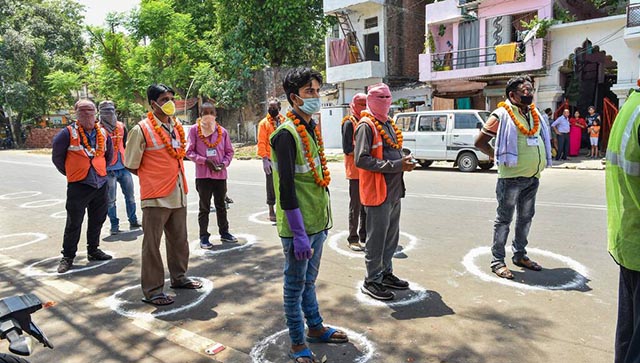Odisha has taken rapid strides in providing safely managed, inclusive water and sanitation services in recent years, emerging as a frontrunner in the sector. The Housing and Urban Development Department, the nodal department for urban development in Odisha, has prioritised the wellbeing of vulnerable groups in solving for challenges in sanitation service delivery and in ensuring the safety and empowerment of sanitation workers. The initiatives undertaken by Odisha serve as an excellent learning model for ensuring the inclusion and empowerment of vulnerable communities, to be replicated across states as best practices. GARIMA Scheme: Ensuring dignified livelihoods across the sanitation value chain Making a landmark move in empowering sanitation workers across the sanitation value chain, the Housing and Urban Development Department, Odisha, launched the GARIMA Scheme in 2020. It is a unique state-wide scheme to secure the welfare and dignity of 20,000 sanitation workers exposed to hazardous working conditions which includes being in proximity with sewers, drains, public and community toilets which includes close contact with fecal sludge in toilets, septic tanks and treatment facilities. To this end, the GARIMA scheme has created a corpus fund of Rs. 50 crores to ensure financial and social security benefits for sanitation workers and their families. Additionally, the scheme identifies 5 categories of core sanitation workers as skilled and highly skilled workers, making Odisha one of the first states in India to take this progressive step. Continuing their efforts towards enabling worker safety, as part of the #SafaiMitraSurakshaChallenge to ensure the occupational safety and wellbeing of sanitation workers, Bhubaneswar took key initiatives for the mechanization of sewer and septic tank cleaning in the city. This includes focus on 100 per cent mechanical cleaning of sewer and septic tanks in the city and the establishment of an Emergency Response Unit (ERSU) as per guidelines issued under Garima scheme for regular monitoring of sewer/septic tank cleaning. Periodic monitoring has resulted in regular reporting by Private Sanitation Service Organisations (PSSOs) and adherence to protocols. Empowering communities with sustainable livelihoods For the past few years, the government has been promoting sustainable livelihood initiatives by engaging Self-Help Groups (SHGs) in the sanitation ecosystem across all urban local bodies (ULBs) in the state. Around 3, 410 SHGs of women and trans persons are engaged in various interventions in the sanitation ecosystem. In a pioneering move, women and trans persons’ SHGs and their federations have been engaged in the Operation and Maintenance of fecal sludge treatment facilities in as many as 100 ULBs in Odisha. These services were earlier carried out by male technical staff. Unlike other community engagement models which are largely informal, the model of engaging SHGs for Operation and Maintenance work through a formal contract as a service provider is both unique and professional. As a major step towards inclusivity, the SeTP (60 KLD capacity co-treatment plant) in Cuttack city (Cuttack Municipal Corporation) was handed over to an SHG for trans communities (Bahucharamata SHG) for Operation and Maintenance in June 2020. Since then, the group has been successfully managing the plant and its work, has exploded many myths, narratives and barriers about involving the third gender in sanitation and public-private partnership. Bahucharamata SHG’s work has been a trailblazer of sorts and has paved the way for the entire trans community to get engaged in not only Operation and Maintenance of additional SeTPs in SWM, but also in collection of parking fees and holding tax in many other cities across the state. Various ULBs in Odisha have deployed SHGs for trans communities in several interventions in the sanitation supply chain; for example, managing battery operated vehicles for waste segregation, Operation and Maintenance of micro-composting centres, collection of property taxes, etc. The Bahucharamata SHG along with Swikriti SHG managing the plant in Bhubaneswar have been crucial in motivating the trans community to be part of the mainstream through public partnerships. Inspired by the Cuttack model, another SHG for trans communities (Surabhi SHG) took up the Operation and Maintenance of the SeTP in Parlakhemundi town in October 2021. In another path-breaking intervention, the Department has handed over the Operation and Maintenance of an 8-MLD Water Treatment Plant to the Bahucharamata group in which 30 more trans persons have been integrated. A similar model has been implemented in Nimapada town in Puri distric, where seven trans persons led SHGs are managing the plant. Odisha has taken significant steps to ensure not only the inclusion of vulnerable groups in sanitation service delivery, but also the empowerment of these groups by enabling dignified livelihoods. While women and trans persons are often viewed majorly as users of sanitation facilities, they play an important role in ensuring that these facilities are safe, inclusive and accessible when empowered as sanitation professionals. Going a step further, when sanitation workers who are often from vulnerable groups are recognised as sanitation professionals and supported to ensure their safety, and social and financial security, communities are empowered in significant ways. Odisha stands as a stellar example of this, with models that have the potential to be replicated across states in India. By making concerted efforts and adapting the inclusive models established in Odisha to local conditions, states across India can move towards the goal of safely managed sanitation for all by 2030. Bhawna Prakash and Elisa Patnaik are partner and project manager at Ernst & Young. Ernst & Young is also a part of NFSSM Alliance. Views expressed are personal. Read all the Latest News , Trending News , Cricket News , Bollywood News , India News and Entertainment News here. Follow us on Facebook , Twitter and Instagram .
Safe sanitation: Odisha’s pathbreaking initiatives empowering workers and vulnerable communities
Bhawna Prakash and Elisa Patnaik
• June 29, 2023, 15:29:48 IST
Odisha has taken significant steps to ensure not only the inclusion of vulnerable groups in sanitation service delivery
Advertisement
)
End of Article